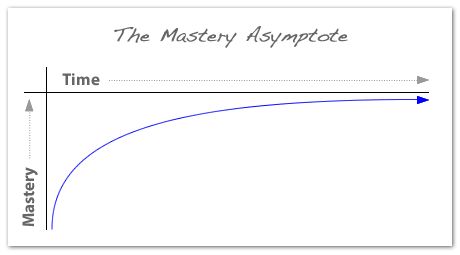Mastery Mindset
It is very likely that you already possess a mastery mindset - at least about your area of expertise. After all, you wouldn't be teaching your course(s) as an expert if you had said to yourself, "I'm just no good in this discipline - I'll never get any better."
Statements such as these, however, reflect the beliefs of many of our students. These beliefs lead to a lack of motivation among our students and a self-fulfilling prophecy of failure to improve in the areas in which they believe they are unalterably limited.
"Mastery mindset" refers to having a goal of mastering certain subjects, skills, or materials, and a belief that this can be done.
Daniel Pink (2009) outlines some crucial points to understand about a mastery mindset:
- Individuals with a mastery mindset believe intelligence is not fixed but instead can be increased.
- Striving for mastery is arduous. There will be setbacks and obstacles on the path to mastery, and even without these, aiming for mastery requires a dedication of time and effort.
- Mastery is an asymptote - always approaching perfection, but perfection is never reached. This elusiveness makes mastery both fascinating and, at times, frustrating.?

How Can I Encourage a Mastery Mindset Among my Students?
1. Make sure your statements and actions reflect a mastery belief.
- It can be easy at times to fall into thinking that certain students "don't have what it takes" to master the subject you teach. The only thing that students may lack is a mastery mindset - the belief that with effort, they can improve. Make sure this is how you think, rather than communicating (intentionally or not) to a student that they lack the intelligence to succeed.
2. Introduce the concept of a mastery mindset to your students.
- There is no need to keep this concept a secret! Explain to students what a mastery mindset is and what its key characteristics are - then tell them you want them to have this mindset for the subject matter and skills required in your course. Resurrect the idea from time to time during the semester, particularly as you give feedback on work. For example, you might tell students, "Remember that mastery is an asymptote - we all work to get to perfection, but it's an unreachable goal. That's why, as you improve on your work in this course, my feedback will get more refined and detailed - to help you get closer to that goal of mastery!"
3. Call students on their lack of mastery mindset.
- Students often make statements that reflect their belief that they cannot get better at something (e.g., a task, a set of concepts, C-level work). How many times have you heard, "I'm a bad test-taker."? When students make remarks such as this, counter them immediately with a statement reflecting your firm belief that improvement is possible. For example, "I think you would definitely improve on that skill - you just need to work at it and practice!"
4. Use rubrics.
- Grading rubrics, which describe levels of performance on an assignment, communicate to students how improvements can be made with effort. They also provide explicit information about exactly where efforts should be focused in order to produce quality work. Consider providing rubrics to students ahead of their assignment due dates, so they can assess their work against your grading standards. Not only does a rubric communicate rich information to students about their performance, but they economize the time you spend giving that feedback.